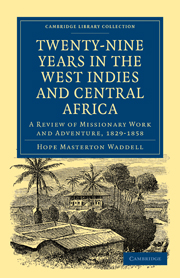 Twenty-Nine Years in the West Indies and Central Africa
Twenty-Nine Years in the West Indies and Central Africa Book contents
- Frontmatter
- Preface
- Contents
- CHAPTER I 1829
- CHAPTER II 1830, 1831
- CHAPTER III 1832
- CHAPTER IV 1832, 1833
- CHAPTER V 1834, 1835
- CHAPTER VI 1836, 1837
- CHAPTER VII 1837, 1838
- CHAPTER VIII 1838-1840
- CHAPTER IX 1841-1844
- CHAPTER X 1841-1845
- CHAPTER XI 1845
- CHAPTER XII 1846
- CHAPTER XIII 1846
- CHAPTER XIV 1846
- CHAPTER XV 1846, 1847
- CHAPTER XVI 1847
- CHAPTER XVII 1847
- CHAPTER XVIII 1847
- CHAPTER XIX 1847, 1848
- CHAPTER XX 1848, 1849
- CHAPTER XXI 1850
- CHAPTER XXII 1850
- CHAPTER XXIII 1850
- CHAPTER XXIV 1851
- CHAPTER XXV 1851
- CHAPTER XXVI 1852
- CHAPTER XXVII 1852
- CHAPTER XXVIII 1853, 1854
- CHAPTER XXIX 1855
- CHAPTER XXX 1856
- CHAPTER XXXI 1857
- CHAPTER XXXII 1858
- CHAPTER XXXIII 1858
- APPENDIX
- Plate section
CHAPTER XXXIII - 1858
Published online by Cambridge University Press: 07 September 2011
- Frontmatter
- Preface
- Contents
- CHAPTER I 1829
- CHAPTER II 1830, 1831
- CHAPTER III 1832
- CHAPTER IV 1832, 1833
- CHAPTER V 1834, 1835
- CHAPTER VI 1836, 1837
- CHAPTER VII 1837, 1838
- CHAPTER VIII 1838-1840
- CHAPTER IX 1841-1844
- CHAPTER X 1841-1845
- CHAPTER XI 1845
- CHAPTER XII 1846
- CHAPTER XIII 1846
- CHAPTER XIV 1846
- CHAPTER XV 1846, 1847
- CHAPTER XVI 1847
- CHAPTER XVII 1847
- CHAPTER XVIII 1847
- CHAPTER XIX 1847, 1848
- CHAPTER XX 1848, 1849
- CHAPTER XXI 1850
- CHAPTER XXII 1850
- CHAPTER XXIII 1850
- CHAPTER XXIV 1851
- CHAPTER XXV 1851
- CHAPTER XXVI 1852
- CHAPTER XXVII 1852
- CHAPTER XXVIII 1853, 1854
- CHAPTER XXIX 1855
- CHAPTER XXX 1856
- CHAPTER XXXI 1857
- CHAPTER XXXII 1858
- CHAPTER XXXIII 1858
- APPENDIX
- Plate section
Summary
We resume our account of Calabar affairs; for important and singular events occurred, soon after we left the country, which must be briefly noticed.
Towards the close of 1858, King Eyo suffered occasionally from severe pains about his heart; and forewarned thereby, it is supposed, publicly recognised his eldest son as his successor, charging him and the chiefs of the town that, in the event of his death, no persons should be killed for him. Having gone to his Uwet plantations, he had another violent attack, sent for Dr. Hewan, and recovered. Being a Sabbath there, he suspended labour as usual, called his people together for public worship, and desired Esien Ukpabio to officiate, who addressed him and them from solemn and appropriate words: “Watch, for ye know neither the day nor the hour when the Lord cometh.” After his return to town he transacted business as usual for a week, and, among other things, gave the brethren an audience, and satisfactory assurances concerning the French demand for negroes for their West Indian colonies, then pressed, by a French ship, on the Calabar people. According to custom, he had his brothers at supper with him one night, but, feeling unwell, ate and drank sparingly. They had all left, and he was rising to retire, when he staggered, fell back on the sofa, and without a word, in a few minutes, expired.
- Type
- Chapter
- Information
- Twenty-Nine Years in the West Indies and Central AfricaA Review of Missionary Work and Adventure, 1829–1858, pp. 642 - 660Publisher: Cambridge University PressPrint publication year: 2010First published in: 1863
